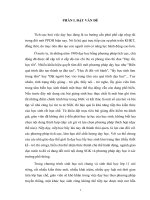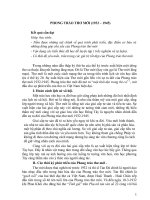ADVERB MANNERS- CỰC HAY-ENGLISH VERSION
Bạn đang xem bản rút gọn của tài liệu. Xem và tải ngay bản đầy đủ của tài liệu tại đây (90.37 KB, 12 trang )
1. Adverbs of manner
Adverbs of manner are the largest group of adverbs. Most adverbs of manner are closely
related to corresponding adjectives. Although some words can be used as either adjectives
or adverbs, in most cases, adverbs of manner are formed by adding ly to the corresponding
adjectives.
a. Spelling rules for adding ly
In most cases, ly is simply added to the positive form of the adjective. For example:
Adjective Adverb of Manner
bad badly
complete completely
normal normally
surprising surprisingly
i. Adjectives ending in ic
However, when the adjective ends in ic, the syllable al is usually added before the ly
ending. For example:
Adjective Adverb of Manner
dramatic dramatically
scientific scientifically
specific specifically
ii. Adjectives ending in le
When the adjective ends in le preceded by a consonant, the final e is usually changed to y,
to form the ly ending. For example:
Adjective Adverb of Manner
favorable favorably
humble humbly
simple simply
When the adjective ends in le preceded by a vowel, in most cases, ly is simply added to the
positive form of the adjective. For example:
Adjective Adverb of Manner
agile agilely
sole solely
However, in the case of the adjective whole, the final e is removed before the ending ly is
added:
Adjective Adverb of Manner
whole wholly
iii. Adjectives ending in ll
When the adjective ends in ll, only y is added. For example:
Adjective Adverb of Manner
dull dully
full fully
shrill shrilly
iv. Adjectives ending in ue
When the adjective ends in ue, the final e is usually omitted before the ending ly is added.
For example:
Adjective Adverb of Manner
due duly
true truly
v. Adjectives ending in y
When the adjective ends in y preceded by a consonant, the y is usually changed to i before
the ending ly is added. For example:
Adjective Adverb of Manner
busy busily
easy easily
happy happily
However, in the case of the adjectives shy and sly, ly is simply added to the positive form
of the adjective:
Adjective Adverb of Manner
shy shyly
sly slyly
When the adjective ends in y preceded by a vowel, in most cases, ly is simply added to the
positive form of the adjective. For example:
Adjective Adverb of Manner
coy coyly
grey greyly
However, in the case of the adjective gay, y is changed to i before the ending ly is added:
Adjective Adverb of Manner
gay gaily
See Exercise 1.
It should be noted that while most adverbs which end in ly are adverbs of manner, other
types of adverb may also end in ly. For instance, consequently and subsequently are
connecting adverbs. The following are adverbs of frequency which are formed by adding ly
to the corresponding adjectives.
Adjective Adverb of Frequency
frequent frequently
rare rarely
usual usually
b. Adverbs which do not use the ending ly
The adverb of manner well appears unrelated to the corresponding adjective, good. Good
and well both have the comparative form better and the superlative form best.
Adjective Adverb of Manner
good well
It should be noted that in addition to being used as an adverb, the word well can also be
used as an adjective with the meaning healthy. The adjective well is most often used as a
predicate adjective.
e.g. Well used as an Adjective : I hope you are well.
Well used as an Adverb : He did well on the examination.
In the first example, well is a predicate adjective, modifying the pronoun you. In the
second example, well is an adverb of manner, modifying the verb did.
The following table gives examples of adverbs of manner, location, time and frequency
which have the same forms as the corresponding adjectives.
Adjective Adverb of Manner
fast fast
hard hard
little little
loud loud or loudly
much much
straight straight
Adjective Adverb of Location
far far
high high
low low
near near
wide wide
Adjective Adverb of Time
early early
first first
late late
long long
Adjective Adverb of Frequency
daily daily
monthly monthly
weekly weekly
yearly yearly
See Exercise 2.
It should also be noted that there are several adjectives ending in ly which have no
corresponding adverbs:
friendly
likely
lively
lonely
silly
ugly
When it is desired to use one of these words to modify a verb, an adverb phrase of manner
may be used. In the following examples, the adverb phrases are underlined.
e.g. He behaved in a friendly manner.
They acted in a silly way.
The following table gives examples of pairs of adverbs which are closely related, but which
have different meanings.
Adverbs With and Without ly Endings
Adverb Meaning Adverb Meaning
hard with effort hardly scarcely
high opposite of low highly very; very well
late opposite of early lately recently
near opposite of far nearly almost
wide opposite of narrow widely commonly
The meanings of these adverbs are illustrated in the following examples.
e.g. I worked hard.
I have hardly enough time to finish.
He threw the ball high into the air.
He is highly successful in what he does.
The class began late.
The weather has been cold lately.
I held my breath as the squirrel crept near to get the nuts.
I have nearly finished reading the book.
I opened the door wide.
That theory is widely believed.
c. The differing functions of adjectives and adverbs
When an adverb differs in form from a corresponding adjective, it is necessary to
distinguish between the functions of adjectives and adverbs in order to determine which
form should be used in a given situation.
Whereas adjectives modify nouns, pronouns, and expressions which serve the same
grammatical functions as nouns; adverbs modify verbs, adjectives and adverbs.
i. Adjectives which modify nouns compared with adverbs which modify verbs
The following examples illustrate the distinction which must be made between adjectives
which modify nouns and adverbs which modify verbs. The adjectives and adverbs are
printed in bold type, and the words which are modified are underlined.
e.g. Adjective: It has been a quiet afternoon.
Adverb: The afternoon passed quietly.
Adjective: She is a good musician.
Adverb: She plays the flute very well.
In the first pair of sentences, the adjective quiet modifies the noun afternoon, whereas the
adverb quietly modifies the verb passed. In the second pair of sentences, the adjective
good modifies the noun musician, whereas the adverb well modifies the verb plays.
In informal English, adjectives are sometimes used to modify verbs.
e.g. She plays good.
In this example, the adjective good is used to modify the verb plays. However, this use of
adjectives is considered to be grammatically incorrect.
See Exercise 3.
ii. Adjectives which modify nouns compared with adverbs which modify adjectives
The following examples illustrate the distinction which must be made between adjectives
which modify nouns and adverbs which modify adjectives.
e.g. Adjective: a large wooden building
Adverb: a largely wooden building









